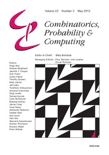
COMBINATORICS PROBABILITY & COMPUTING
Scope & Guideline
Innovating Research at the Forefront of Applied Mathematics
Introduction
Aims and Scopes
- Combinatorial Structures and Properties:
The journal focuses on the exploration of various combinatorial structures, including graphs, hypergraphs, and set systems, examining their properties, relationships, and applications. - Probabilistic Methods in Combinatorics:
A significant emphasis is placed on probabilistic techniques used in combinatorial contexts, addressing topics such as random graphs, percolation theory, and probabilistic algorithms. - Computational Complexity and Algorithms:
Research on the design and analysis of algorithms for combinatorial problems is a core area, including discussions on efficiency, approximation, and computational limits. - Graph Theory and Its Applications:
The journal extensively covers topics in graph theory, including Ramsey theory, coloring problems, and the study of specific graph classes, reflecting their relevance in various applications. - Connections to Statistical Mechanics and Physics:
There is a unique contribution through the exploration of connections between combinatorial structures and concepts in statistical mechanics, particularly in the analysis of phase transitions and probabilistic models.
Trending and Emerging
- Random Structures and Phase Transitions:
There is an increasing focus on random structures, particularly the study of phase transitions in random graphs and hypergraphs, which suggests a trend towards understanding complex behaviors in large systems. - Algorithmic Combinatorics:
The rise of algorithmic approaches in combinatorial problems is evident, with a growing interest in developing efficient algorithms for complex combinatorial structures and their applications in various fields. - Interdisciplinary Connections with Machine Learning:
Emerging research is exploring the connections between combinatorial optimization and machine learning techniques, indicating a trend towards applying combinatorial methods to solve problems in data science and artificial intelligence. - Advanced Probabilistic Models:
There is a notable increase in studies employing advanced probabilistic models to analyze combinatorial structures, such as Gibbs measures and random walks, reflecting a deeper integration of probability theory with combinatorial methods. - Dynamic and Adaptive Systems:
Research on dynamic systems and adaptive algorithms is gaining traction, focusing on how combinatorial structures evolve over time and how algorithms can adapt to these changes.
Declining or Waning
- Classical Ramsey Theory:
Although Ramsey theory has been a staple of combinatorial research, recent papers suggest a declining emphasis on classical results, possibly due to saturation in this area and a shift towards more complex and generalized problems. - Static Graph Properties:
Research focused solely on static properties of graphs, without probabilistic or dynamic considerations, appears to be waning, as newer studies increasingly incorporate probabilistic models and dynamic aspects. - Elementary Combinatorial Techniques:
There is a noticeable decrease in the publication of papers relying strictly on elementary combinatorial techniques, as the field moves towards more sophisticated methodologies involving probabilistic and computational approaches.
Similar Journals

DISCRETE MATHEMATICS AND THEORETICAL COMPUTER SCIENCE
Advancing Knowledge at the Intersection of Mathematics and ComputingDISCRETE MATHEMATICS AND THEORETICAL COMPUTER SCIENCE, published by DISCRETE MATHEMATICS THEORETICAL COMPUTER SCIENCE in France, stands as a significant open-access journal since 1997, publishing innovative research articles within the intersecting disciplines of discrete mathematics and theoretical computer science. With an ISSN of 1462-7264 and an E-ISSN of 1365-8050, this journal aims to provide a platform for scholarly discourse and dissemination of knowledge, making it accessible to a global audience. It is recognized for its contributions, achieving a Q2 ranking in both Computer Science (Miscellaneous) and Discrete Mathematics and Combinatorics, alongside a Q3 ranking in Theoretical Computer Science as of 2023. The journal’s rigorous selection process ensures that only high-quality research is published, promoting advancements in these critical areas of study. Researchers, professionals, and students alike can benefit from its comprehensive articles that not only enhance theoretical understanding but also foster practical applications in the ever-evolving landscape of computer science.

Annals of Combinatorics
Exploring the Frontiers of Discrete MathematicsAnnals of Combinatorics, published by Springer Basel AG, serves as a premier platform for innovation and research in the field of discrete mathematics and combinatorics. With an ISSN of 0218-0006 and an E-ISSN of 0219-3094, the journal captures the ongoing developments and breakthroughs that characterize this dynamic discipline, which plays a crucial role in various applications such as computer science, optimization, and statistical mechanics. The journal has been recognized as part of the Q2 category in the 2023 rankings for discrete mathematics and combinatorics, reflecting its significant contribution to the academic community. Researchers and educators alike benefit from its insightful articles that not only cover theoretical advancements but also practical implications. With convergence years spanning from 2005 to 2024, the Annals of Combinatorics continues to be an essential resource for anyone looking to deepen their understanding and explore new frontiers in combinatorial research.
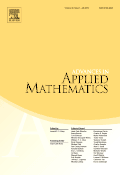
ADVANCES IN APPLIED MATHEMATICS
Exploring the Frontiers of Mathematical InnovationADVANCES IN APPLIED MATHEMATICS, published by ACADEMIC PRESS INC ELSEVIER SCIENCE, is a prestigious journal that has served the mathematical community since 1980. With its ISSN 0196-8858 and E-ISSN 1090-2074, the journal is based in the United States, specifically in San Diego, CA. As a leading periodical in the field, it holds a notable Q2 ranking in Applied Mathematics and has been consistently ranked in the 43rd percentile among similar journals, illustrating its relevance and impact within the discipline. Although not an Open Access journal, ADVANCES IN APPLIED MATHEMATICS plays a crucial role in disseminating significant research findings, theoretical studies, and innovative applications of mathematics that address real-world problems. Researchers, professionals, and students alike will find valuable insights in its carefully curated publications, making it an essential resource for those looking to advance their understanding and application of mathematics.
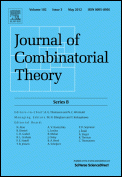
JOURNAL OF COMBINATORIAL THEORY SERIES B
Championing Excellence in Discrete MathematicsJOURNAL OF COMBINATORIAL THEORY SERIES B, published by Academic Press Inc., Elsevier Science, is an esteemed journal within the discipline of combinatorial theory, discrete mathematics, and theoretical computer science. With a rich history since its inception in 1971 and ongoing publication through 2025, this journal has established itself as a pillar in its field, currently holding Q1 category rankings in multiple areas including Computational Theory and Mathematics, Discrete Mathematics and Combinatorics, and Theoretical Computer Science. The journal features cutting-edge research and developments, attracting contributions from both established professionals and emerging scholars. Despite the absence of an open access option, the journal's strong impact reflected in its Scopus ranks—such as being number 16 out of 92 in Discrete Mathematics and Combinatorics (83rd percentile)—signifies its influential role in advancing knowledge and innovation. Researchers seeking to share impactful findings and connect with a vibrant academic community will find the JOURNAL OF COMBINATORIAL THEORY SERIES B an essential resource.

Contributions to Discrete Mathematics
Pioneering insights in combinatorial research.Contributions to Discrete Mathematics, published by the Department of Mathematics and Statistics at the University of Calgary, serves as a vital platform for disseminating innovative research within the dynamic field of discrete mathematics and combinatorics. Established in 2008, this journal has rapidly gained recognition, currently holding a Q3 classification in discrete mathematics and combinatorics for 2023. As it aims to foster academic dialogue and share groundbreaking discoveries, the journal showcases high-quality peer-reviewed articles that cover a range of topics, from theoretical explorations to practical applications. Although it currently operates under a traditional subscription model, there is a growing commitment to enhancing access options, ensuring that critical knowledge is available to researchers and practitioners alike. With its notable Scopus ranking of #50 out of 92 within its category, this journal is positioned as an important resource for students, academics, and industry professionals who seek to stay at the forefront of discrete mathematics research.

COMBINATORICA
Fostering Innovation in Discrete Mathematics ResearchCOMBINATORICA, published by Springer Heidelberg, is a leading international journal dedicated to advancing the fields of Discrete Mathematics and Combinatorics. With an illustrious history dating back to 1981 and a remarkable commitment to excellence, this journal has earned its place in the highest echelons of academic publishing, currently ranked in the Q1 category for both Computational Mathematics and Discrete Mathematics and Combinatorics. Located in Germany and recognized for its high-quality research contributions, COMBINATORICA fosters innovative discussions and disseminates significant findings that shape contemporary mathematical theory. Although it does not offer Open Access options, its rigorous peer-review process ensures that each publication meets the highest scholarly standards, making it an essential resource for researchers, professionals, and students engaged in mathematical sciences. With an impactful H-Index reflecting its citation influence, COMBINATORICA continues to be a pivotal platform for groundbreaking research in combinatorics and its applications.
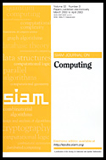
SIAM JOURNAL ON COMPUTING
Catalyzing Innovative Solutions to Computational Challenges.Welcome to the SIAM Journal on Computing, a premier publication of SIAM Publications dedicated to advancing the field of computational science. Established in 1984, this journal provides a platform for groundbreaking research and theoretical advancements that shape the landscape of both Computer Science and Mathematics. With an impressive impact factor and consistently ranking in Q1 quartiles for its categories, the journal remains an essential resource for scholars looking to contribute to innovative computational theories and methodologies. Although not currently an open-access journal, the SIAM Journal on Computing offers rigorous peer-reviewed articles, ensuring high-quality contributions that appeal to researchers, professionals, and students alike. As we converge towards 2024, this journal continues to play a vital role in influencing future research directions and fostering an academic community devoted to the exploration of computational challenges. Join us in exploring the forefront of computing research!
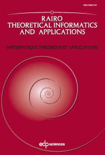
RAIRO-THEORETICAL INFORMATICS AND APPLICATIONS
Exploring the Frontiers of Theoretical Informatics.RAIRO - Theoretical Informatics and Applications is a renowned academic journal published by EDP Sciences S A that has been at the forefront of disseminating innovative research and applications in the fields of computer science and mathematics since its inception in 1995. With a focus on theoretical and applied aspects of informatics, the journal serves as a vital resource for researchers and professionals seeking to explore the intricacies of computational theories and their practical applications. Although currently lacking an Open Access model, it provides invaluable insights from distinguished researchers within its Q4 category rankings across its pertinent fields. As reflected in its Scopus rankings, including a position in the 24th percentile for General Mathematics and the 9th percentile for Computer Science Applications, RAIRO is pivotal in contributing to the ongoing discourse and advancements in theoretical informatics. Researchers, professionals, and students will find this journal critical in understanding emerging trends and challenges in the rapidly evolving domains of computer science and mathematics.

Analele Stiintifice ale Universitatii Ovidius Constanta-Seria Matematica
Advancing Mathematical Frontiers with Open Access InsightAnalele Stiintifice ale Universitatii Ovidius Constanta-Seria Matematica is a prominent open-access journal established by OVIDIUS UNIV PRESS in Romania, dedicated to advancing the fields of mathematics, specifically in Analysis and Applied Mathematics. Since its inception, the journal has emphasized the dissemination of high-quality research, making it accessible to a global audience. With an ISSN of 1224-1784 and E-ISSN 1844-0835, it has positioned itself within the academic community, achieving a respectable Q3 ranking in both analysis and applied mathematics in 2023, reflecting its commitment to rigorous scholarship. The journal spans a considerable publication window from 2009 to 2024, catering to the ongoing developments in mathematical sciences and their applications. Researchers, professionals, and students alike will find valuable insights and contributions that enrich their understanding and foster collaboration within the mathematical community. The journal's headquarters is based at the Faculty of Mathematics & Computer Science, Bulevardul Mamaia 124, Constanta, Romania.

Journal of Combinatorics
Elevating Mathematical Discourse in CombinatoricsJournal of Combinatorics is a premier academic journal dedicated to advancing the field of combinatorial theory and its applications. Published by INT PRESS BOSTON, INC, it aims to provide a robust platform for researchers, professionals, and students to disseminate their findings and engage with cutting-edge developments in combinatorics. With a focus on high-quality, peer-reviewed articles, the journal fosters rigorous mathematical discussions surrounding various facets of combinatorial structures, graph theory, design theory, and combinatorial optimization. Although currently not available as an Open Access journal, the Journal of Combinatorics plays a vital role in enriching the mathematical sciences and serves as an essential resource for academics seeking to stay updated with the latest trends in combinatorial research. By maintaining a commitment to excellence and innovation, this journal is indispensable for anyone looking to deepen their understanding in this critical area of study.